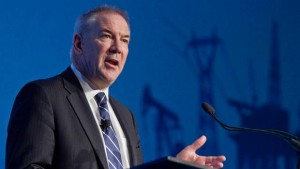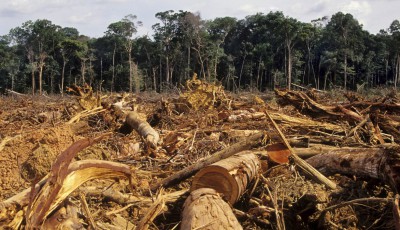Doing nothing is not an option we can choose – Suncor Energy on Climate Change

Steve Williams, CEO Suncor Energy
Editor’s Note: The following is the transcript of the Keynote address by Steve Williams, President and CEO of Suncor Energy at In This Together: Carbon Pricing and Alberta’s Family Business, in Calgary, Alberta on May 22, 2015.
“Good morning everyone and welcome.It’s great to see so many familiar faces here. A special thanks to Canada’s Ecofiscal Commission and the Max Bell Foundation for their help in bringing us all together.
I’m pleased to be part of the Ecofiscal Commission’s Advisory board – it’s focusing attention on the important issue of climate change and is an effective voice in what’s become a very polarized debate.
The reason why I’ve been so keen on the Commission and its efforts, is that it’s facilitating an intelligent, practical discussion, and it starts with the premise that it’s a healthy economy and environment that we ALL want and need.
At the Commission’s Advisory Board, you’ll find representatives from across the political spectrum, from academia, from industry and from the environmental community. It’s taking partisanship out of the discussion and helping us to have meaningful conversations on how to move forward to address environmental challenges, including climate change.
The Ecofiscal Commission is about helping Canada move to a position of leadership and how we can set the agenda, bringing the best ideas forward.
The conversation we’re having couldn’t be more important. And its timing is significant given everything that’s going on:
- As we know, discussions continue at the federal level regarding greenhouse gas emission targets.
- Governments around the world are preparing for the 2015 United Nations Climate Change Conference in Paris. The hope there is that for the first time in over 20 years of UN negotiations, a binding and universal agreement on climate will merge from all the nations of the world.
- At the federal level, we’ve heard just over a week ago that the Government of Canada has committed to reducing greenhouse gas emissions by 30% below 2005 levels by 2030.
- Various provincial governments, including Alberta, BC, Ontario and Quebec have carbon pricing mechanisms or are contemplating them. And of course, the election of a New Democratic Party government in Alberta, has refocused attention on the path forward here in the province.
This is all happening at a time when crude oil prices have fallen hard and fast in a very short period of time. And it’s practically impossible to predict when or how they’ll recover. The current crude price environment does point to the importance of public policy decisions being made in the context of the health of the economy, Canadian competitiveness, and the environment.
We can’t have a healthy economy without being leaders in environmental performance. And we can’t have a healthy environment without having a healthy economy.
As the Ecofiscal Commission has shown, the economy and the environment are extremely intertwined and can’t be separated when it comes to sound government policy. We can’t have a healthy economy without being leaders in environmental performance. And we can’t have a healthy environment without having a healthy economy.
I hope that’s the kind of conversation we have today.
Today’s conference title, “Carbon Pricing and Alberta’s Family Business” is definitely thought-provoking. It reminds us that, much like a family business, there’s deep pride, a commitment to collaborate and a strong sense of innovation in the oil and gas industry.
Whether it’s harnessing technology to unlock the potential of the oil sands, or working together to solve environmental challenges, the industry is focused on raising the bar. One example is Canada’s Oil Sands Innovation Alliance, where 13 companies have come together to share technologies and best practices to drive environmental performance. To date, over 750 technologies worth nearly one billion dollars have been shared.
Alberta was also the first jurisdiction in Canada to act on climate change through the Specified Gas Emitters’ Regulation. While some might debate whether the current levels are appropriate, it does require funds to be directed towards a technology fund, which is specifically directed to environmental tech. Its focus is to encourage meaningful GHG reductions, while driving low-carbon innovation. That’s an investment in our future and helps demonstrate that Alberta can be a leader when it comes to supporting technology.
Thinking about our industry in the context of a family business also highlights that there’s some risks we need to take into consideration. Those include:
- controlling costs – we need to make sure that the costs we incur can be supported by our business model and market conditions, and
- taking a long term view – we need to make sure that we can sustain our business, rather than focus on short term fixes.
I think it’s important to point out, that Alberta’s family business is Canada’s business. Alberta’s ability to thrive and grow directly impacts Canada’s economic prospects. Those impacts include direct and indirect job creation, supply chain spending, and taxes and royalties right across the country.
Climate change is happening. Doing nothing isn’t an option we should choose.
As we move to ensure our economic prosperity, we have to remember that the environment is a critical consideration. Our actions need to protect it, and yes, help build our environmental reputation.
There’s three characteristics that should define our efforts going forward.
First, the pressing need to take action. Climate change is happening. Doing nothing isn’t an option we should choose.
In addition to the Ecofiscal Commission, there various voices have contributed to this conversation. One example is David Keith, who has worked at the intersection of climate science, energy technology and public policy. I’d encourage you to check out his interview with Jim Brown on CBC radio, where he pointed out the need to embrace an ecomodernist manifesto. His point is that we need to be deliberate in our actions and embrace technology in getting to a better future.
That brings me to the second characteristic, which is the need to embrace innovation and be bold. We need to find effective ways to tackle the climate change issue. We need to remember that 80% of the emissions from a barrel of oil come from the point of combustion, or the point of use.
If we’re truly going to tackle the GHG challenge, we need to look at mechanisms that address both supply and demand elements of the equation. And, we need to make sure that we continue to invest in and share technology that can help us reduce our carbon footprint.
At Suncor, we believe Canada’s oil sands are a world-class resource that need to be developed responsibly to meet growing global demand. We support public policy that:
- is broadly based across the economy
- drives best achievable performance from existing facilities
- provides clear support for and positions Canada and Alberta as a leader in innovation and technology
- and sets challenging, but achievable reduction goals, with an increase in ambition as technology develops.
Finally, we need to embrace the concept of directional leadership. Scientists have told us that we must limit the atmospheric concentrations of CO2 as soon as possible.
We need to remember that 80% of the emissions from a barrel of oil come from the point of combustion, or the point of use.
Canadians are looking for us to take action. We may not have all the answers but let’s not be afraid to start. That means developing, implementing, and yes, maybe even testing policy solutions to drive behaviours in the right direction.
One example I like to use is the type of levy that’s been put into place in the City of London, which is aimed at reducing congestion. It’s not something that people would have thought feasible, but it’s working – literally helping reduce the numbers of vehicles on London’s streets.
A global, international, or national framework may not be in place yet, but just as other public policies have taken hold across this continent – think seat belt legislation – so too can we take further action in support of the environment.
We think the right place to start is with the provinces – they’re closer from a regulatory perspective to the issue, and have already started. It’s important, though, not to underestimate the power of coordination between jurisdictions. In the end, it is what will be required to ensure that we make meaningful progress on a larger scale.
The challenges we face in terms of climate change and public policy certainly loom large.
Like the hurdles family businesses often need to overcome, they will require determination, hard work, and collaboration to get to where we want to be: both a healthy environment and a prosperous economy.
In short, the path forward is really about choosing the energy future we want. In environmental terms, that is as clean and sustainable as we can get. In financial terms, energy needs to be affordable, innovative and create jobs and fuel the economy. In social terms, energy should help us sustain important systems like education and health care. We must realize they are all linked. We can’t do one without the other.
Complex challenges require creative collaboration. The challenges we collectively face are multi-faceted and deeply embedded in systems. To make a change, we need to look at the underlying system. And we need to work together to do it, sometimes with unlikely partners.
The energy future we all want is certainly not simple. It’s also too important to get wrong.
We all have a role to play in the future energy system. Each of us as leaders has a responsibility, if not a duty, to thoughtfully – and reflectively – work together to create a sustainable energy future.
This is an important time. We have an opportunity to work towards global milestones and opportunities. But we need to take the time to ensure we get it right for our economy, our environment, Alberta and Canada.
I’m excited to be part of the conversation being convened by Canada’s Ecofiscal Commission.
I and Suncor welcome the opportunity to work with you, governments and others across this country going forward. Thank you and I look forward to today’s discussions.”







